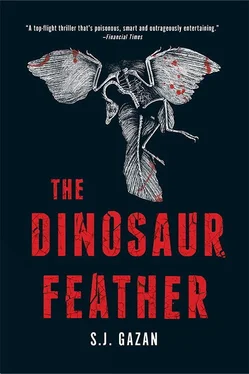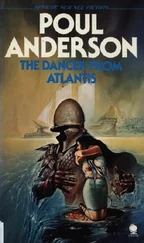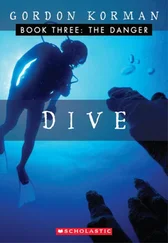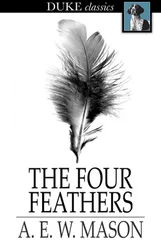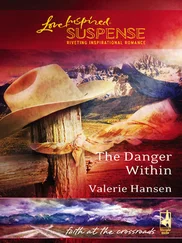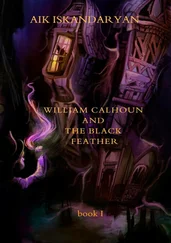“It’s just so awful,” Vibe said, over and over. She was leafing through the newspapers. “It’s unbearable.” With tears streaming down her cheeks, she told him about an Australian mother who had been with her two sons when the tsunami hit and how she hadn’t been strong enough to hold on to them both. She had had to let go of her older son, who was seven. Now he was gone. Vibe dissolved completely. Søren didn’t utter a sound.
“Do you want to come in?” she asked, when Søren had parked in front of her apartment block. Søren shook his head.
Maja, Bo, and Katrine weren’t on the lists of missing persons. Søren checked the homepages of the Danish Foreign Office every thirty minutes every single day. They weren’t there. Why hadn’t they called? He would scream at Katrine when he saw her. Teach her never to be so selfish again. He wondered whom to call. He couldn’t think of anyone. Officially, he had no relationship with the Beck Vestergaard family. He had donated some sperm, and there was no one he could call. Vibe rang him several times, but he could barely breathe and he couldn’t talk to her.
Bo called on January 5 in the evening. Søren had tried to eat some take-out food, but he had lost his appetite. He was standing by the window; the telephone was on the window sill. He answered it after the first ring.
The weight dropped off Søren, and halfway through January he took a sick leave. Bo called every day, but Søren ignored the telephone. Once, Bo tricked him by calling from a different number. Bo screamed at him, and Søren hung up. After that, Søren stopped answering his telephone. Twice, someone banged on his front door in the night. Søren knew it was Bo. He didn’t open the door, instead he lay very still under his comforter. Eventually Bo gave up.
Søren spent his days with Knud, stroking the old man’s hair and watching him waste away.
“Shouldn’t you be at work?” Knud asked. Søren shook his head.
The night before Knud died, he lay in the living room in Snerlevej, hooked up to a morphine drip, dosing himself nearly all the time Søren was there. It wasn’t until nine in the evening that Knud suddenly woke up and reached out for Søren. Knud’s blue eyes were alert, but he struggled to speak.
“Vibe,” he said.
“Vibe isn’t here today. Do you want me to call her?”
Vibe had gone out to dinner. They had agreed that she would leave her cell phone on silent so that Søren could call her if Knud deteriorated. Søren reached for his cell.
Knud made a grunting noise, which stopped Søren in his tracks.
“No, don’t call,” he hissed. His eyes rolled a couple of times, then his eyelids closed heavily and just as Søren decided to get up and make some coffee, Knud’s voice could be heard again.
“You should love your woman,” he wheezed, “like I love Ella.” Knud was the only one who had ever called Elvira “Ella.”
“I look forward to dying,” he said, and now his voice sounded strangely clear, like the Knud Søren used to know.
“Because I’ll see her again.” He smiled faintly. Knud was an arch-atheist. A tear rolled down his cheek.
“And I so want to see her again.”
Søren fought hard not to cry.
“And Vibe…”
“We’ve agreed that I’ll call her,” Søren said again.
“Shut up,” Knud snarled, as though it was less painful to rebuke him with a quick crack of the whip than with a lengthy explanation. Søren glanced at the morphine drip.
“Vibe is like a daughter to Ella and me.” His voice was calm now. “But if you love someone, you should be willing to die for them.” He closed his eyes. Søren sat still like a statue. Knud opened his eyes again and said: “And you’re not willing to die for Vibe. This much I know.” Those were his last words.
Søren rested his head on his grandfather’s emaciated thighs, covered by the blanket, and sobbed. He thought he would never be able to stop. He could feel Knud’s hand move slightly, but Knud was now too weak to reach his head. Søren was Denmark’s youngest police superintendent, he could identify a murderer from the mere twitching of a single, out-of-place eyebrow hair, he could knit backward, and everyone he had ever loved had died and left him behind.
Søren parked his car in the basement under Bellahøj police station. He walked up the stairs, filled the coffee machine in the kitchen, switched it on, and went to his office while the water dripped through the filter. It was all a long time ago now. Elvira, Maja, Knud. Three years. Søren contemplated the sky. It looked like it might snow, even though it was only October. He was rummaging around on his desk, looking for a report he had to finish writing, when Henrik burst in without bothering to knock first.
“Hi, Søren,” Henrik said. “Fancy a lecture at the College of Natural Science?”
Søren looked perplexed, but he reached for his jacket and started putting it on.
“A very upset guy by the name of Johannes Trøjborg dialed 911 an hour ago saying his academic supervisor lay dying in his office. Sejr and Madsen followed the ambulance, and they have just called in to report that the deceased, as he is now, is a Lars Helland, age fifty-seven, a biologist and a professor at the University of Copenhagen. The preliminary findings from the paramedic who attended the scene suggest that Helland died of a heart attack.” Søren started taking off his jacket. “But,” Henrik raised his hand to preempt him and checked his notes, “Professor Helland’s severed tongue was lying on his chest, and young Mr. Trøjborg has lost his shit. The deputy medical coroner and the boys from forensics are on their way. Are you coming?”
Søren rose and zipped his jacket. They went to the garage and drove at high speed to the university. Henrik told a completely unfunny joke, and Søren watched the sky, which looked as if it were about to burst.
Clive Freeman lived in Canada and was professor of Palaeoornithology at the department of Bird Evolution, Palaeobiology, and Systematics at the University of British Columbia—where he had worked for almost thirty years. He lived on Vancouver Island, not far from campus, and he specialized in bird evolution.
It was generally accepted that birds descended from a primitive reptile, the thecodont, and the most likely candidate for the role of the ancestor of all birds was the archosaur Longisquama . Most scientists—people whom Freeman respected—argued that modern birds were living dinosaurs. Professor Freeman disagreed.
Clive had grown up in the far north of Canada, the only child of the famous behavioral biologist David Freeman, one of Canada’s most important wolf experts in the latter half of the twentieth century. David taught his son all there was to know about the woods; the life cycle of trees, the forest floor, and the flora and fauna. There was never any doubt that Clive would grow up to be a biologist.
When Clive turned twelve, he made up his mind to specialize in birds. Birds were the most advanced animals on the planet. The primitive reptile they descended from was also believed to be the ancestor of turtles and crocodiles. A bird skeleton was streamlined, its bones were hollow and filled with air and provided the bird with superior movements, its plumage was perfect, and its egg-laying process was second to none. People never thought about that when sparrows pecked their lawns or pigeons soiled the windshields of their cars. This appealed to Clive. It was as if he alone had spotted the ruby in the dust.
Clive’s father didn’t care for birds.
“It’s actually shocking how little you know about the local wolves, given that your father is a world-famous expert,” the elder Freeman remarked one day. He had tested Clive on the subject of mammalian teeth over dinner, and Clive hadn’t been very successful. He could remember molars and premolars. “And eye-teeth,” he had added. Clive’s father gave him a long, hard stare.
Читать дальше
